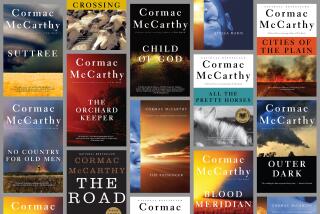Discoveries
- Share via
American Purgatorio
A Novel
John Haskell
Farrar, Straus & Giroux: 240 pp., $23
He begins looking for his wife. They were on their way to New Jersey to visit her mother. They stopped at a gas station/convenience store. He went in to get food. When he came out, she was gone. He spends a few days “waiting for normalcy to return,” trying to remember what happened. Finally, after several days of exasperating lethargy (a quality John Haskell paints with excruciating accuracy), he begins driving across the country, following a route outlined on a map that he found in her desk drawer.
“I believed,” he thinks, pitifully, “I could control what the world was doing.” He is so darned out of it, so completely disengaged from the world, that the reader isn’t quite sure what happened either. Did she run off with someone else? Was she kidnapped? Is she dead, leaving him in some foggy state of denial?
“As human beings we have an idea of who we are, and we like to keep that idea intact,” he thinks, one of many revelations he moves through as he makes his way to California, picking up hitchhikers. Each new acquaintance offers some wisdom but no practical clues to finding his beloved wife.
The chapters in Haskell’s enigmatic novel are named for the seven deadly sins. Slowly, our lost husband begins to remember details from the scene at the convenience store. Against a dharma bum backdrop of LSD parties in Colorado yurts, thermal springs run by Indian healers, a Hopi reservation and a Southern California beach, he moves closer to the love of his life.
“I remember back to who I was with Anne, who I wanted to be with Anne, trying to build my life -- and our life together -- thinking I was building it, happy that I was there in the world, with her, although at the time I wasn’t thinking about it, I was just doing it. It was my dream.”
Haskell, whose short story collection “I Am Not Jackson Pollock” promised the raw wit of thirtysomething passive-aggressive lit, now proves that he can keep it going for the novel, adding mystery and kindness to his palette.
*
Things of the Hidden God
Journey to the Holy Mountain
Christopher Merrill
Random House: 280 pp., $24.95
“My marriage was in tatters, war reporting had taken the place of poetry, and I was of an age to realize that the resolution of my latest health crisis was just a temporary reprieve,” writes Christopher Merrill, explaining his first pilgrimage in 1989 to Mount Athos, a males-only monastic community in northern Greece, considered by many to be the spiritual home of the Eastern Orthodox Church.
“I had traded,” he writes, “the physical dangers of covering the breakup of Yugoslavia for the psychic risks of opening my heart to the possibility of grace.” And it is risky, what Merrill refers to as “unlearning everything,” “untelling” the story of his life “to write a new one based on Scripture and patristic literature.” Merrill comes to Athos with all the symptoms of spiritual indifference, “the noonday demon.”
His soul is sick: sick of war, sick of arguing with his wife. He has lost his faith in literature, the guide that, from the surrealists to our finest poets of nature, had always sharpened his “sense of how to live.” Merrill makes three trips to Mount Athos, wandering from monastery to monastery. As he walks, he thinks aloud about the roots of Christianity and the appeal of asceticism.
He is frustrated by the monks’ refusal to grant him access to rituals and texts but understands, quoting Pseudo-Dionysius: “Let your respect for the things of the hidden God be shown in knowledge that comes from the intellect and is unseen. Keep these things of God unshared and undefiled by the uninitiated.”
Merrill’s great strengths as a writer have always been his ability to braid the past, present and future; his lightheartedness; and his willingness to digest those books the rest of us may never read and give the reader the gift of their essential wisdom. In his new book, Merrill, ever God’s fool, also gives us something of himself, of his own wisdom and transformation.
More to Read
Sign up for our Book Club newsletter
Get the latest news, events and more from the Los Angeles Times Book Club, and help us get L.A. reading and talking.
You may occasionally receive promotional content from the Los Angeles Times.








